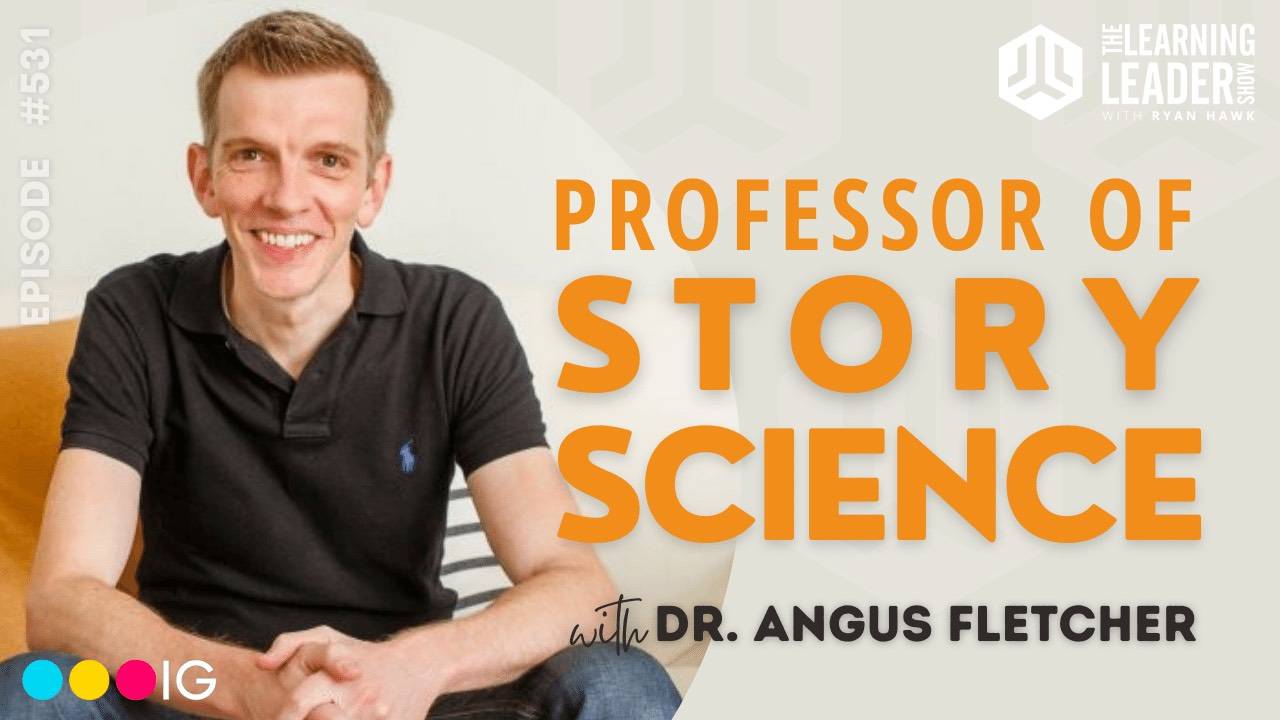Dr. Angus Fletcher has dual degrees in neuroscience (BS, University of Michigan) and literature (Ph.D., Yale). His research employs a mix of laboratory experiment, literary history, and rhetorical theory to explore the psychological effects—cognitive, behavioral, therapeutic—of different narrative technologies. He’s the best-selling author of multiple books including Wonderworks: The 25 Most Powerful Inventions in the History of Literature, and Storythinking: The New Science of Narrative Intelligence.
WATCH this conversation on YouTube. And SUBSCRIBE!
Read my book, The Pursuit Of Excellence — See why Patrick Lencioni said “This book is an absolute must-read if you care to live an excellent life.”
FORBES called WELCOME TO MANAGEMENT, “the best leadership book of 2020.”
Be part of “Mindful Monday” — Text Hawk to 66866 Subscribe on iTunes or Stitcher Radio
The Learning Leader Show
- “The story you tell yourself needs to be the true story of yourself.”
- How Angus tells his story:
- Build trust
- Listen
- Demonstrate courage – Angus told a group of special forces operators one of the most embarrassing stories of his life. After that, he said, “I’m not scared of anything.”
- You must be genuinely humble to learn from your mistakes.
- “Real leaders activate the leader within you.”
- Being a leader is all about contemplating fear. Stepping up when adversity strikes is why we exist as leaders. It’s easy to lead when everything is going well. We want to be known as the leader who is there when it’s hard.
- Dr. Fletcher’s ultimate goal of using the power of story to bring us closer to self-actualization. Seems like that’s a good first step to being a great leader.
- Confidence is earned by creating evidence for yourself that you can do hard things. Angus did this when he shared his story of not making it through Marine Corps boot camp. Angus’s vulnerability earned trust with the military leaders.
- “For the longer we suspend our judgments, the more accurate our subsequent verdicts become. This valuable fact has been uncovered by researchers who’ve spent decades probing the mechanics of better decision-making, only to discover that the key is simply more time and more information. Which is to say: reserving our judgment until the last possible moment.”
- Unlike a computer, the brain wasn’t particularly data-driven. Or particularly logical. Instead, it was emotional. And creative. And powered by story.
- “There are a number of judgments that we can suspend permanently, including most of our judgments about other people. Our brain is constantly making such judgments. It looks at strangers on the street—and judges them. It looks at celebrities in magazines—and judges them. It looks at family members and colleagues and friends in homes and offices and restaurants—and judges them. These judgments feel instantly good to our neurons; they deliver pleasant microdoses of emotional superiority. But in the long run, they make us anxious, incurious, and less happy, so we can improve our long-term mental well-being if we suspend them.”
- Apply to be part of my Leadership Circle
- 02:12 – Highlights of Leadership Training04:24 – How to Prevent Failure09:14 – What is a Story Scientist?12:57 – Is Story Science Therapy?14:22 – Tell Your Story18:56 – Vulnerability is the Most Powerful Thing You Can Do22:00 – Can You Go Too Far With Being Vulnerable?25:19 – How to Be Vulnerable32:42 – Real Leaders Activate the Leader In You36:10 – Where Does Your Sense of Confidence Come From?40:50 – Punch Through Your Own Fear43:00 – Be Open About What Could Go Wrong44:47 – Questions to Ask During the Interview Process48:33 – Responding to Adversity IS Leadership51:45 – How to Be Excellent at Speaking56:27 – Advice For Younger Leaders
- Read: The Pursuit Of Excellence
- Read: WELCOME TO MANAGEMENT
- Be part of “Mindful Monday” — Text HAWK to 66866
- Read: Wonderworks
- Connect with me on LinkedIn
- Join our Facebook Group: The Learning Leader Community
- To Follow Me on Twitter: @RyanHawk12
Time Stamps
More Learning:
Episode 078: Kat Cole – From Hooters Waitress To President of Cinnabon
Episode 216: Jim Collins — How To Go From Good To Great
Episode #300: AJ & Keith Hawk – How To Instill Work Ethic & Curiosity In Your Children
Episode #303: General Stanley McChrystal – The New Definition Of Leadership


Leave A Comment